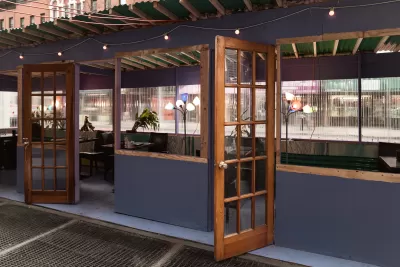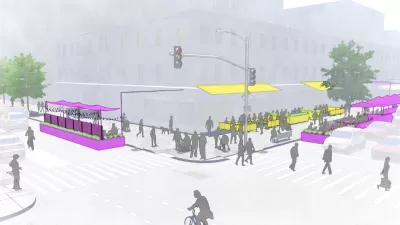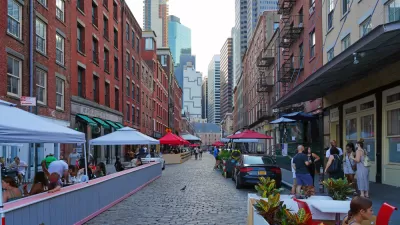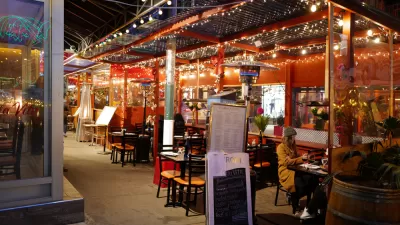Some restaurant owners worry the new requirements will make it too expensive to maintain outdoor dining structures.

Last Thursday, the New York City city council approved a bill permanently legalizing the outdoor dining structures that started dotting the city during the Covid-19 pandemic.
According to an article by Emma G. Fitzsimmons in The New York Times, “The bill aims to strike a balance by retaining a popular al fresco program while regulating it more closely, allowing for the clearing of abandoned or ugly dining sheds.” The bill also requires restaurants to take down the structures between November 30 and March 31, an addition that some restaurant owners say adds extra cost for dismantling and storage and reduces their ability to seat more customers during winter.
Under the bill, expected to be signed by Mayor Eric Adams, “the city’s Transportation Department would set basic design guidelines that have yet to be determined. Restaurants could offer outdoor dining from 10 a.m. until midnight and would be required to pay fees based on their location and square footage, with higher fees in Manhattan south of 125th Street.”
Supporters of the bill, like Kate Slevin, executive vice president at the Regional Plan Association, say the bill is “not 100 percent perfect” but provides a reasonable compromise. Others point out that the added expenses could exclude all but the most financially successful restaurants.
FULL STORY: New York City Is Poised to Make Outdoor Dining Permanent, With Caveats

Planetizen Federal Action Tracker
A weekly monitor of how Trump’s orders and actions are impacting planners and planning in America.

Congressman Proposes Bill to Rename DC Metro “Trump Train”
The Make Autorail Great Again Act would withhold federal funding to the system until the Washington Metropolitan Area Transit Authority (WMATA), rebrands as the Washington Metropolitan Authority for Greater Access (WMAGA).

The Simple Legislative Tool Transforming Vacant Downtowns
In California, Michigan and Georgia, an easy win is bringing dollars — and delight — back to city centers.

The States Losing Rural Delivery Rooms at an Alarming Pace
In some states, as few as 9% of rural hospitals still deliver babies. As a result, rising pre-term births, no adequate pre-term care and "harrowing" close calls are a growing reality.

The Small South Asian Republic Going all in on EVs
Thanks to one simple policy change less than five years ago, 65% of new cars in this Himalayan country are now electric.

DC Backpedals on Bike Lane Protection, Swaps Barriers for Paint
Citing aesthetic concerns, the city is removing the concrete barriers and flexposts that once separated Arizona Avenue cyclists from motor vehicles.
Urban Design for Planners 1: Software Tools
This six-course series explores essential urban design concepts using open source software and equips planners with the tools they need to participate fully in the urban design process.
Planning for Universal Design
Learn the tools for implementing Universal Design in planning regulations.
Smith Gee Studio
City of Charlotte
City of Camden Redevelopment Agency
City of Astoria
Transportation Research & Education Center (TREC) at Portland State University
US High Speed Rail Association
City of Camden Redevelopment Agency
Municipality of Princeton (NJ)





























